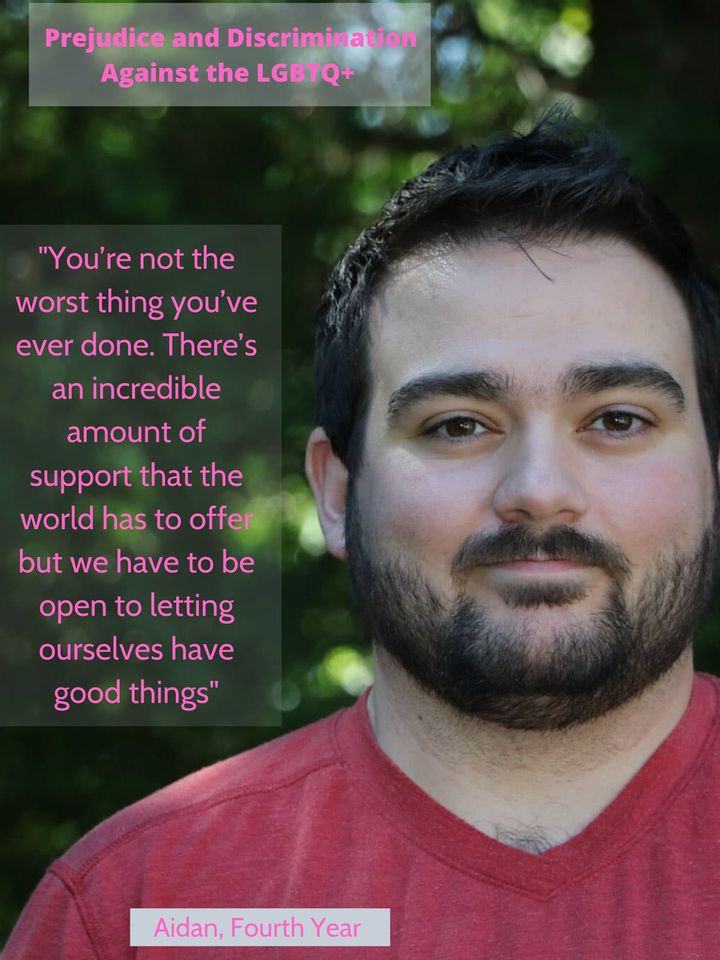Aiden, 4th Year
Meet Aidan!
Aidan is a 4th year student completing a double major in History and Political Science. Aidan describes himself as being resilient, an overthinker, and optimistic. As a consequence of studying at the University of Toronto, which often promotes a competitive and always-improving perspective, he is often self-critical. Despite this tough environment and his shy nature, he is resilient and has overcome discrimination that empowers him to stand up for others. He enjoys reading, writing (often on Twitter), and giving back to the community.
Moving On From
Aidan started his university career in 2011 and found the transition from high school to university to be particularly rough. Coming from an alternative high school with a graduating class of 15 people, to a university environment where people tend to only look out for themselves, was a difficult adjustment for Aidan to make. Recovering from trauma and mental illness was also a challenge in an environment which seemed to offer little support. After a little over 2 years at the University of Toronto, Aidan made the decision to leave to go to Sheridan College in January of 2014. He’d come to the realization that he wouldn’t be able to make it at UofT as his lack of academic success was taking a toll on him. Aidan saw that if he needed to, he could drop school and come back later.
In 2015, Aidan left Sheridan College and transferred to Sault College, where he started a Queer Straight Alliance. And in 2017, he graduated from the Fish and Wildlife Conservation Technician diploma program. Cuts to government environmental programs left Aidan without a job and led him to return to the University of Toronto in 2018, after gaining valuable work experience. Aidan draws from his experiences in natural heritage education and resource conservation to further explore his interest in the environment.
Aidan’s return to UofT was better as he was older and motivated by new goals, although his initial trauma was no less prominent. He found improvements in the university environment like advocacy for disability and accessibility related issues, finding worth in courses he didn’t enjoy as much, and more guidance from professors. However, his return to university caused strains on his finances and his mental health. He struggles to find support for disabled students and working while focusing on his academics has proved to be impossible. Reflecting on his college education and his resilience in the face of harassment and assault, he knows the environment in which he can thrive and sets himself up for success through his course load. He only learned about the accommodations that the university offers through a professor that mentioned Accessibility Services. Through this, he was able to find help on campus when he decided that he couldn’t keep up with everything on his own.
Aidan’s parents have been a supportive figure in his life, especially after coming out as queer, lesbian, and eventually transgender to his parents. As an only child, he looks to his father as a strong role model of what it means to be a man who advocates for anti-oppression. On most days, he’s happy with who he is and focuses on self-improvement but carries shame of the person who he was. He finds that setting goals and thinking about how his actions impact others helps him grow.
In 2010, during his process of transitioning, he suffered a hate crime that left him with long-term disabilities. In his opinion, this trauma shifted his life path for the better, as he holds more compassion and empathy for others, and advocates against intersectional oppression. After being angry and self-destructive for 5 years after the assault, the positive role models in his life lifted him out of distress. Despite the assailants not being identified, he remains hopeful in his healing journey by researching how to cope with trauma. In retrospect, he would tell his assailants that their intent to hurt and make him feel less of himself was initially successful, but he is now a stronger individual, so they truly failed to bring him down. He struggles with PTSD, depression, anxiety, and a physical disability, but is thankful that the current movement in disability advocacy reminds him of others in similar circumstances. The sexual harassment that he suffered puts his encounters with others following the incident into perspective. Now that Aidan is a passing man who’s experienced discriminative assault, he’s privy to hearing conversations that he wouldn’t beforehand because people make comments without knowing that his past life experience.
Aidan defines his resilience as his understanding that things aren’t always good, but he can get through it. After spending years being afraid of things that could happen, he’s in a position of confidence and courage to overcome any possible challenges. From feeling non-deserving of good things and fearful of rape culture’s tendency of blaming the victim, he looks towards the future where we can rely on each other to fight oppression together. This past summer, he wrote a thesis about moral injury in WWI. Moral injury entails the idea that things we see, do or hear can affect our souls; it is a moral transgression that is often self-deprecating. The assault he suffered encouraged him to do things he isn’t proud of for several years, and he pushes himself to overcome these struggles.
Take Home Message
“Act with more thought and self-love. You’re not the worst thing that has happened to you. Whatever that worst moment is, that’s not you. You have to
leave things in the past sometimes”- to his past self
“You’re not the worst thing you’ve ever done. There’s an incredible amount of support that the world has to offer but we have to be open to letting ourselves have good things” – to the people reading this

